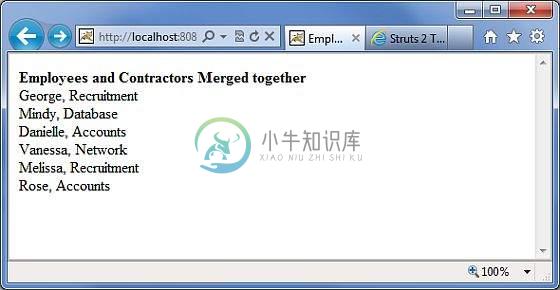检查详细示例(Check Detailed Example)3
优质
小牛编辑
146浏览
2023-12-01
假设您有两个列表A和B,其值为A1,A2和B1,B2。 合并列表将为您提供A1,B1,A2,B2。
创建动作类
首先让我们创建一个名为Employee.java的简单类,它看起来像 -
package cn.xnip.struts2;
import java.util.ArrayList;
import java.util.List;
import org.apache.struts2.util.SubsetIteratorFilter.Decider;
public class Employee {
private String name;
private String department;
public Employee(){}
public Employee(String name,String department) {
this.name = name;
this.department = department;
}
private List employees;
private List contractors;
public String execute() {
employees = new ArrayList();
employees.add(new Employee("George","Recruitment"));
employees.add(new Employee("Danielle","Accounts"));
employees.add(new Employee("Melissa","Recruitment"));
employees.add(new Employee("Rose","Accounts"));
contractors = new ArrayList();
contractors.add(new Employee("Mindy","Database"));
contractors.add(new Employee("Vanessa","Network"));
return "success";
}
public Decider getRecruitmentDecider() {
return new Decider() {
public boolean decide(Object element) throws Exception {
Employee employee = (Employee)element;
return employee.getDepartment().equals("Recruitment");
}
};
}
public String getName() {
return name;
}
public void setName(String name) {
this.name = name;
}
public String getDepartment() {
return department;
}
public void setDepartment(String department) {
this.department = department;
}
public List getEmployees() {
return employees;
}
public void setEmployees(List employees) {
this.employees = employees;
}
public List getContractors() {
return contractors;
}
public void setContractors(List contractors) {
this.contractors = contractors;
}
}
Employee类有两个属性 - name和department ,我们还有两个员工列表 - 永久employees和contractors 。 我们有一个名为getRecruitmentDecider的方法,它返回一个Decider对象。 如果员工在recruitment部门工作,则Decider实现返回true,否则返回false 。
接下来,让我们创建一个DepartmentComparator来比较Employee对象 -
package cn.xnip.struts2;
import java.util.Comparator;
public class DepartmentComparator implements Comparator {
public int compare(Employee e1, Employee e2) {
return e1.getDepartment().compareTo(e2.getDepartment());
}
@Override
public int compare(Object arg0, Object arg1) {
return 0;
}
}
如上例所示,部门比较器按字母顺序比较基于部门的员工。
创建视图 (Create Views)
使用以下内容创建名为employee.jsp的文件 -
<%@ page contentType = "text/html; charset = UTF-8"%>
<%@ taglib prefix = "s" uri = "/struts-tags"%>
<html>
<head>
<title>Employees</title>
</head>
<body>
<b>Employees and Contractors Merged together</b>
<br />
<s:merge id = "allemployees">
<s:param value = "employees" />
<s:param value = "contractors" />
</s:merge>
<s:iterator value = "allemployees">
<s:property value = "name"/>,
<s:property value = "department"/><br/>
</s:iterator>
</body>
</html>
merge标记将两个或多个列表作为参数。 我们需要为合并提供一个id以便我们以后可以重用它。 在此示例中,我们将员工和承包商作为参数提供给merge标记。 然后,我们使用“allemployees”id迭代合并列表并打印员工详细信息。
配置文件 (Configuration Files)
你的struts.xml看起来应该像 -
<?xml version = "1.0" Encoding = "UTF-8"?>
<!DOCTYPE struts PUBLIC
"-//Apache Software Foundation//DTD Struts Configuration 2.0//EN"
"http://struts.apache.org/dtds/struts-2.0.dtd">
<struts>
<constant name = "struts.devMode" value = "true" />
<package name = "helloworld" extends = "struts-default">
<action name = "employee"
class = "cn.xnip.struts2.Employee"
method = "execute">
<result name = "success">/employee.jsp</result>
</action>
</package>
</struts>
您的web.xml应该如下所示 -
<?xml version = "1.0" Encoding = "UTF-8"?>
<web-app xmlns:xsi = "http://www.w3.org/2001/XMLSchema-instance"
xmlns = "http://java.sun.com/xml/ns/javaee"
xmlns:web = "http://java.sun.com/xml/ns/javaee/web-app_2_5.xsd"
xsi:schemaLocation = "http://java.sun.com/xml/ns/javaee
http://java.sun.com/xml/ns/javaee/web-app_3_0.xsd"
id = "WebApp_ID" version = "3.0">
<display-name>Struts 2</display-name>
<welcome-file-list>
<welcome-file>index.jsp</welcome-file>
</welcome-file-list>
<filter>
<filter-name>struts2</filter-name>
<filter-class>
org.apache.struts2.dispatcher.FilterDispatcher
</filter-class>
</filter>
<filter-mapping>
<filter-name>struts2</filter-name>
<url-pattern>/*</url-pattern>
</filter-mapping>
</web-app>
右键单击项目名称,然后单击“ Export 》 WAR File以创建War文件。 然后在Tomcat的webapps目录中部署此WAR。 最后,启动Tomcat服务器并尝试访问URL http://localhost:8080/HelloWorldStruts2/employee.action 。 这将产生以下屏幕 -


